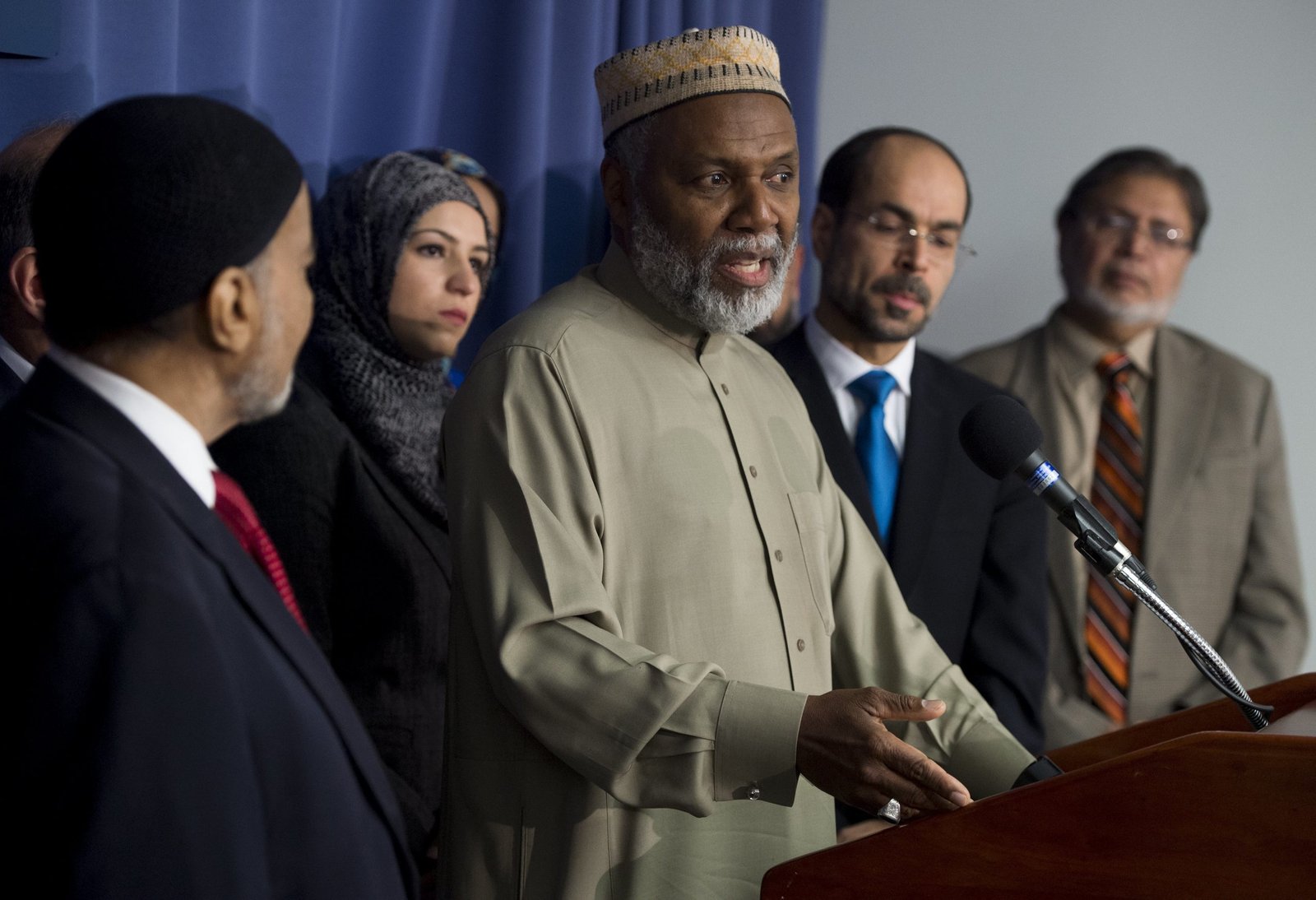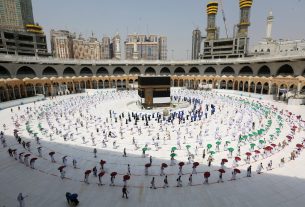The Chief Imam of Daaru Na’im Central Mosque, Sheikh Imran Abdulmajeed Eleha, says relating with Muslim scholars of different ideologies to discuss issues pertaining to Islam is an action that is allowed by the Shari’ah, adding that engaging them is not disapproved by scholars, once it is based on maslaha (public interest).
The Sheikh made this statement in reaction to critics who condemned him for inviting Muslims of different ideologies, including Tijaniyyah, Qadiriyyah, Salafiyyah, Ahlus Sunnah, among others, to the Daaru Na’im International Conference.
This year’s conference was the 14th edition of the annual international conference organised by the Islamic organisation. It commenced on Sunday, December 25 and ended on Wednesday, January 4, 2023.
Muslim News gathered that the theme of the conference was, ‘Understanding of Managing Differences in the Field of Islamic Da’wah’.
According to Sheikh Eleha in a presentation monitored by our correspondent, he clarified the issue stating, “We invited everyone including the Tijaniyyah, Qadiriyyah, Salafiyyah, Ahlus Sunnah, every other person that is affiliated to Islam to our annual conference. Some persons criticised me for this. I am, however, surprised if they didn’t see or understand the topic of our conference. The nature of the topic in itself requires that every group, regardless of their ideological leanings, must contribute to the discourse. The topic is ‘Understanding of Managing Differences in the Field of Islamic Da’wah’.
“Do the Tijaniyyah, Qadiriyyah people say they are not calling to Islam? Is it not Islam they also claim to be calling to? So, if we are to discuss a topic that bothers on difference of opinions, it is those we differ with in terms of opinions that we’ll converge with to have the conversation. They will make their points and we will also make ours. And then we place the two side by side in light of the Qur’an and Sunnah. What is clear is that once we provide evidence from the Qur’an and Sunnah, a person that is reasonable enough and subservient to Allah will accept it. We did not just start this conference. I wonder where these latter day critics have been!.”
The Saudi Arabia-trained Nigeria-born scholar said the conference has made so many impacts, noting further that Muslim brothers who were misguided have been guided by attending it.
He added that relating and engaging with a mubtadi (heretic) is not disapproved by scholars once it is based on maslaha (pubic interest).
“It was in one of our conferences that some people brought up the issue of fuji music, claiming it is permissible. Our scholars quickly debunked that narrative. So many people have benefitted from our conference. Some people were misguided before, but by virtue of the conference – following the guidance from Allah – they were guided.
“I know most of these critics do not have proper understanding of scholars’ opinion on relating with a mubtadi (heretic). Let me clarify few things. Abdullahi bn Abbas was a foremost Sahaba (companion of the Prophet, PBUH). He related with the Khawaarij. The Sufi people are not worse than the Khawaarij, but Abdullahi bn Abbas still related with them, engaged them. After their deliberations, the companion still gained some to his side. It should not be about fighting, abusing them alone. We need to engage them and make convincing points to win their hearts.
“I urge the critics to do more in reading Islamic literatures. There are dozens of people who practise bid’ah (heresy) that Ibn Taimiyyah engaged and they later embraced Sunnah. Ibn Qayyim used to be a mubtadi. He was a student of Ibn Taimiyyah. If they had not related or engaged each other, how would Ibn Qayyim have joined the fold of Ahlus Sunnah?
“Scholars agree to relationship with a mubtadi that is open to superior argument and adjustment. Among them is Sheikh Abdulazeez Ar-Rayyis. When he was asked about sitting with a mubtadi, the scholar said the basis is that such is not acceptable, but if it is to achieve public interest or correction, such is not bad. In fact, the Lajnah Daa’imah (Permanent Committee for Fatwah and Research) in Saudi Arabia, made similar position on the issue.
“Therefore, inviting or engaging a mubtadi is permissible once such is premised on a positive outcome. I wonder which mubtadi will come to Daaru Na’im Conference and not be changed for good with the calibre of scholars invited to clarify issues of religious importance. Many people have attended our conference with positive impacts on them.”
Sheikh Eleha explained that he had attended several conferences in Saudi Arabia where Salafiyyah, Tijaniyyah, Ashariyyah scholars meet and discuss Islamic issues.
He noted that they disagree but do that respectfully among themselves without quarrel or rancour, saying such is the wise method of calling to the path of Allah which can guide the misguided ones.
“The second point is that what unites all of us is Islam. We will continue to have differences in opinion and it will not stop until the Day of Judgment. We just need to manage our differences. Even our scholars in Saudi Arabia do manage people. When the Muslim World League (Raabitah) was to be established, one of the scholars invited wad Ibrahim Inyaas. Why didn’t they say he’s a Tijaniyyah and chase him away. Inyaas was a founding member of Raabitah.
“In fact, after the demise of Inyaas, Maahi who is his successor today was invited to hold the position occupied by his late father in the Raabita. This happened not more than a year or two ago. They also charged him with the coordination of all Muslims in West Africa. Therefore, it’s important for us to be careful,” he noted.
“I attended a conference in the university where I graduated in Saudi Arabia. I never knew that Nigeria has a Mufti. It was there I knew because there were posters all around the campus that the Nigerian mufti would address the conference. This conference was attended by several scholars in Saudi Arabia. The Nigerian scholar – and indeed the Nigerian Mufti – that addressed the conference was Baba Ibrahim Maiduguri. He was a student of Ibrahim Inyaas. He does not disguise his affiliation to Tijaniyyah, but he was made to chair a conference session in Saudi Arabia.
“Don’t let us create problems. We will always have issues that will unite us as Muslims. If we call these people and address what they do not understand, they are likely to accept. They are not fighting us. So, why should we fight them?
“I attended another conference where Sheikh Yusuf Qaradawy, Sheikh Ibn Baaz, Sheikh Uthaymeen were all present addressing religious issues. Everyone knows Qaradawy was a leading scholar of the the Muslim Brotherhood (Ikhwaan al-Muslimun). But he was present at a conference chaired by Sheikh Ibn Baaz, a Salafi. I was also in Saudi when the same Sheikh Qaradawy was brought to chair a session. The Aqeedah of the two groups are not similar. The Saudi people are mostly of Salafiyyah and the people of Egypt (Misrah) are mostly of Ashariyyah, but they relate with themselves. Don’t let us confuse things. Relating with them doesn’t mean we won’t explain what we consider to run contrary to the message of Islam. We have done such many times.
“I was also at a conference in Saudi Arabia where Dr. Esaam Albashir, a prominent scholar of the Muslim Brotherhood and then Minister of Islamic Affairs in Sudan was in attendance with Shaykh Salah Aal Shaykh (now the current Mufti of Saudi Arabia). Both of them disagreed on the issue of suicide bombers in Palestine. While Shaykh Salih of Saudi Arabia said they are going to hell for committing suicide, Dr. Esaam Albashir said he considers them as martyrs. He disagreed with him respectfully. I witnessed that conference.
“Our conference is to discuss issues of differences in opinions and those we differ with have to be present. That’s why I invited everyone regardless of their ideological affiliations. We need to clarify things together. We are for peace, not quarrel or war. Through the conference, we can correct some misunderstandings in our brothers. They can also correct ours too. We do not lay claim to perfection. As humans, we are prone to mistakes. Our overall goal is to manage our differences.”




